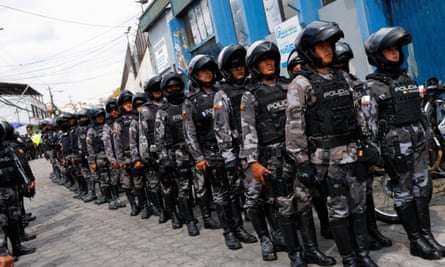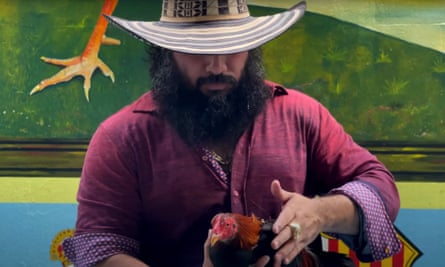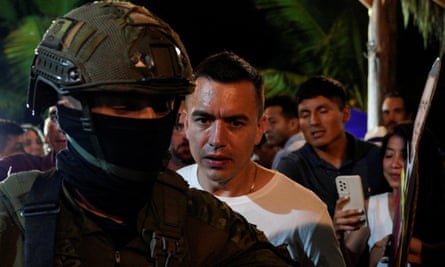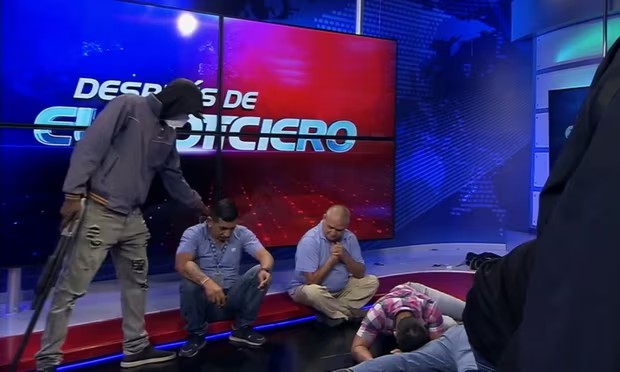Ecuador’s president has declared a state of “internal armed conflict”. How did the country find itself in the grip of armed gangs?
At about 2pm local time yesterday, a live news broadcast on an Ecuadorian TV channel was interrupted by a group of masked men carrying guns, grenades, and dynamite. The intruders pointed guns at employees and made them lie on the floor. “Don’t shoot, please don’t shoot!” one person shouted. One of the attackers said the attack was the result of “messing with the mafias”. The TC Televisión broadcast continued for at least 15 minutes. Then the signal was cut off.
Some 13 gunmen were later arrested, and the hostages taken to safety. The astonishing scenes in the city of Guayaquil were part of a series of audacious coordinated attacks by members of Ecuadorian gangs that have killed at least 10 people. They follow the escape from prison of the country’s most feared gang leader, Adolfo Macías, and new president Daniel Noboa’s subsequent declaration of a state of emergency. And while the situation is evolving rapidly, it appears to represent a declaration of war on the country’s fragile democratic institutions.
Today’s newsletter, with the Guardian’s Dan Collyns, explains what we know about what just happened. Here are the headlines.
Five big stories
- Post Office Horizon scandal | The former Post Office chief executive Paula Vennells is to hand back her CBE over the wrongful prosecution of hundreds of staff, with over 100 more potential victims having come forward in recent weeks. Vennells said on Tuesday she was “truly sorry for the devastation caused to the sub-postmasters and their families”.
- Israel-Gaza war | The British government has accepted that Israel as an occupying power had a legal duty to provide basic supplies to the people of Gaza. David Cameron, the foreign secretary, told MPs that Israel should remove barriers on the delivery of humanitarian aid that were risking “real, widespread hunger”.
- Climate crisis | 2023 has smashed the record for the world’s hottest year by a huge margin. The planet was 1.48C hotter in 2023 compared with the period before the mass burning of fossil fuels ignited the climate crisis, scientists have said.
- Child protection | Boys are watching violent porn on their smartphones then going on to attack girls, police have said, as new data showed children are now the biggest perpetrators of sexual abuse against other children. Overall, the data shows a quadrupling of sexual offences against children.
- US news | A group of men belonging to a Hasidic Jewish community in New York were arrested on Monday amid a dispute over an illegal tunnel secretly dug into the side of a historic synagogue, which has since been closed. Action by law enforcement after the tunnel came to light led to a brawl with those who had created the passageway.
In depth: ‘A declaration of war on the Ecuadorian state’

About half an hour after the masked men appeared at the TV studio, armed police officers arrived on the scene and entered the building. After the perpetrators were arrested, Alina Manrique, the head of news for TC Television, told the Associated Press: “I am still in shock. Everything has collapsed … All I know is that it’s time to leave this country, and go very far away.”
Manrique’s despair points to a much larger crisis linked to the country’s rampant drug gangs. “Ecuadorians are more scared than they’ve ever been,” Dan said. “It’s only in the last few years that it has become such a violent country – people aren’t immune to it. The country is now in shock. This does feel like a declaration of war on the Ecuadorian state.”
What happened yesterday?
As well as the attack on the TV studio, a series of apparently related incidents took place across the country. At least seven police officers were kidnapped. A vehicle was set ablaze at a petrol station in the capital, Quito. Explosives were used in further attacks in the provinces of Esmereldas and Los Rios. There was a jailbreak in the town of Riobamba. Five hospitals were also overtaken.
All of this followed riots in at least six jails on Monday, with guards taken hostage and threatened with death if soldiers were deployed to retake control. Videos disseminated on WhatsApp purported to show guards being lynched, Dan said, though he cautioned they were unconfirmed.
As schools, shops and public buildings closed down, the streets were in gridlock as people fled to the safety of their homes. Ecuador’s new president, Daniel Noboa, declared a state of emergency. “We are not going to negotiate with terrorists,” he said.
The response to that from the gangs was unambiguous. In one prison video, a guard reads out a message with a gun pointed at his head: “You declared war, you will get war,” he says. “You declared a state of emergency. We declare police, civilians and soldiers to be the spoils of war.”
Who did this, and why?

The immediate spark for the chaos of the last couple of days was the escape on Sunday of convicted gang leader Adolfo Macías, alias Fito, from his cell in the prison complex in Guayaquil – the country’s largest city.
Macías is the leader of the Los Choneros gang, one of the most powerful in Ecuador, which is believed to have links to Mexico’s Sinaloa cartel. He was serving a 34-year prison sentence, and previously escaped for several weeks in 2013.
He is said to have been tipped off shortly before he was due to be transferred to a maximum security facility. Macías was living in a spacious cell decorated with murals and had been shown in a music video, ‘The Lion’s Ballad’, relaxing in the prison courtyard and petting a fighting cockerel (pictured above).
“That showed the amount of power these kingpins have even when they’re locked up,” Dan said. “The fact that Macías escaped is not surprising to anyone who knows how things operate in Ecuador. But the extent of the violence we’ve seen since has taken people by surprise. Whether or not it’s not co-ordinated, there are different gangs that are part of this wave of violence.”
Yesterday, Noboa decreed that 22 gangs were now classified as terrorist groups. “They want to be left alone to operate with impunity,” Dan said. “Before, where they would be killing each other, they are now collectively fighting the Ecuadorian state.”
How strong are gangs in Ecuador?
Four months ago, Dan reported from Guayaquil on Ecuador’s “nightmarish descent into violence” over recent years: the gangs have operated with impunity within the prison system there, and used jails as bases for their operations.
In Guayaquil, Dan visited the scenes of gang assassinations and met with relatives of those who had been killed. “It felt like a dark place,” he said. “It’s a bit like Manila and Miami in the same city. There are riverside slums where there are no opportunities at all which are used as routes to get drugs into containers for shipping. And at the same time you have exclusive estates where people barely go out because of the security situation. It is a very unequal city at the heart of this trade.”
There was a mass hostage-taking in six prisons in September and a wave of violence including car bombs and a dynamite attack on a bridge after a senior gang leader was transferred to a new jail. The spike in violence had led to the shocking assassination of presidential candidate Fernando Villavicencio, who was shot dead in August as he left a campaign event. Villavicencio was an anti-corruption candidate who had accused Los Choneros and Macías of threatening him in the days before he was killed.
The murder rate in Ecuador has jumped almost 500% since 2016, with police attributing 80% of the killings to gangs, according to Crisis Group. “That’s one of the highest rates in the world, even by Latin American standards,” Dan said. Local news reports regularly describe beheadings, public hangings, and police assassinations as rivals vie for control of the trade.
The rise in gang violence has been attributed to the killing of Los Choneros’ previous leader, Jorge Zambrano, in 2020. That sparked a struggle for control over drug-trafficking routes and territory. At least 400 prison inmates have died since 2021.
Meanwhile, cartels from as far afield as Mexico and Albania have sought a piece of the Ecuadorian drug trade and are financing local operations. Central to the chaos has been the export of cocaine – a major source of wealth for Ecuador’s gangs because of increased cultivation in neighbouring Colombia and years of lax policing.
How has the government responded to the violence?

Noboa (above), the centre-right 35-year-old heir to a banana fortune, won the presidency in October after Villavicencio’s assassination. He pledged a hard line on gang violence. Shortly after he took office, Jaime Enrique SC, the leader of Los Choneros splinter group Los Lobos, was arrested. That was viewed as a statement of intent and prompted reprisals against local police.
Other measures included a policy of naming judges and prosecutors who release captured gang members, and the construction of new maximum security prisons. Last week, Noboa announced plans for a referendum on further action including an expanded role for the military. In December, he proclaimed the success of his strategy, saying in an interview: “We have captured leaders of criminal groups in recent weeks, from the most important [groups]. One of the groups … has even asked for a peace deal.”
But the events of this week suggest that such optimism was premature. After the TV station was stormed, Noboa said that Ecuador was now in a state of “internal armed conflict”.
“The gangs would like to remove Noboa, because they realise that they may not be able to retain the senior institutional and judicial connections they’ve had before which have guaranteed their impunity,” Dan said. “That’s why we’ve seen this bloodbath take place.”
Source: The Guardian




Recent Comments